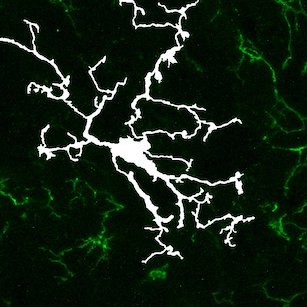
- wenqiang.chen@joslin.harvard.edu
- wenqiang.chen.01@regionh.dk
News
Here I am updating some of my recent news in a chronological way.
Although it is hard, I hope I can make progresses all the time. But 2024 is a great year so far!
11/2024 - 04/2025
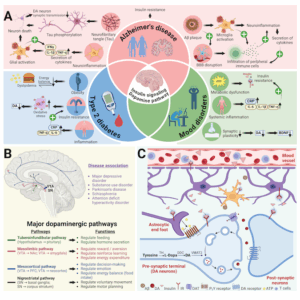
- Online Date: April 29, 2025
- Journal: Neural Regeneration Research (invited perspective)
- Title: Brain insulin resistance and neuropsychiatric symptoms in Alzheimer’s disease: A role for dopamine signaling
- Link: https://journals.lww.com/nrronline/citation/9900/brain_insulin_resistance_and_neuropsychiatric.811.aspx
- My role: Corresponding author
- Status: accepted and online!
- Story behind: Anastasia was one of the three students I have mentored in Bordaux School of Neuroscience. She actually jumped from a Law major to Neuroscience. I was very impressed by how much curiousity on neuroscieence she has during the Summer School. She has a resilience that always wanted to figure things out and make them happen. Later I highly encouraged her to pursue a PhD degree and she did consider it. Then she asked for a reference letter from my and I wrote myself with a strong support. She got in (a PhD program on immunepsychiatry)! On the letter, I wrote, I will do my best to support her carrer growth in what ever format. This piece of writing is one of them. I invited her to join the writing when I receive the invitation and designed a topic that both of us can write. This is a training and I am very proud of the outcome. So proud of her! I am looking forward to her next journey!
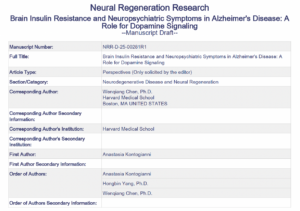
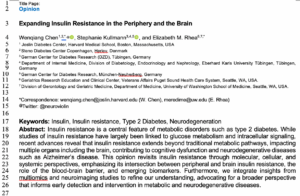
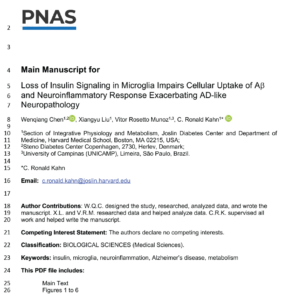
- Date: mid-March, 2025
- Paper #1: Neural Regeneration Research (invited perspective)
- Title: Impaired Brain Insulin Signaling Links to Onset of Neuropsychiatric Disorders in Alzheimer’s Disease: a Role of Dopamine Signaling
- My role: Corresponding author
- Status: accepted!
- Paper #2: Trends in Endocrinology and Metabolism (invited review)
- Title: Expanding the Understanding of Insulin Resistance in Brain and Peripheral
- My role: First author, Corresponding author
- Paper #3: PNAS (research paper)
- Title: Loss of Insulin Signaling in Microglia Impairs Cellular Uptake of Abeta and Neuroinflammatory Response Exacerbating Alzheimer-like Neuropathology
- My role: First author
- Status: accepted
Within two weeks, we have submitted or resubmitted two papers in a row.
- Date: March, 2025
- Paper #1: Nature Communications (research paper)
- Title: A Bottom-Up Noncanonical Auditory Loop Controls Noise-Induced Negative Emotion Perception
- Status: Accepted
- My role: co-author
- Paper #2: Nature Metabolism (research paper)
- Title: A Disinhibitory Circuit Mechanism Underlying the Motivation for Homeostatic and Hedonic Feeding
- My role: co-author
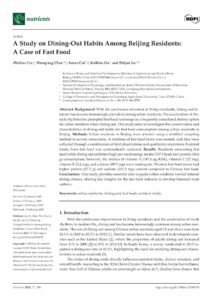
- Online date: February 19, 2025
- Journal: Diabetes (IF = 4.8)
- Title: A Study on Dining-Out Habits Among Beijing Residents: A Case of Fast Food
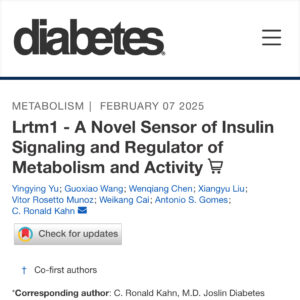
- Online date: February 7, 2025
- Journal: Diabetes (IF = 6.2)
- Title: Lrtm1 – A Novel Sensor of Insulin Signaling and Regulator of Metabolism and Activity
- I helped perform behavioral test and IHC staining for this project
- The project was co-led by Joy and Grace, two first-authors.
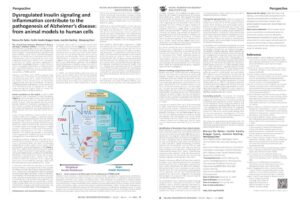
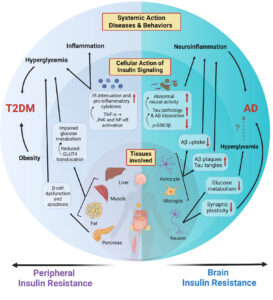
- Accept date: January 9, 2025
- Journal: Neural Regeneration Research (IF = 5.9)
- Title: Dysregulated insulin signaling and inflammation contribute to the pathogenesis of Alzheimer’s disease: from animal models to human cells
- I got invite from the NRR editor to write this and I extended the invitation to my colleagues for the co-write
- Two Danish students participated in this task, extremely talented Marcus led the writing.
- I served as the co-corresponding author and submitting author. Joachim is another corresponding author.
- Very pleasant experience!
- I have to say, Portland is such a lovely city.
- The vibes here on AD research is very strong. I especially love its ADRC, so many great resources and collaborations in AD research!
- My very first AD/PD meeting.
- I will return to Vienna again, the 3rd time.
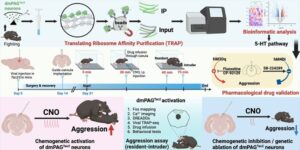
- We identify dmPAGTac2 neurons as critical modulators of aggressive behavior in mouse
- We suggest a distinct molecular target for the treatment of exacerbated aggressive behaviors in populations that exhibit high-level of violence
- PMID: 39744695
- PMCID: PMC11671387
- DOI: 10.7150/thno.101658
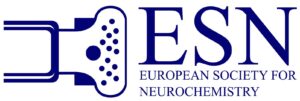
- Session title: Metabolic Alterations Underlying Brain Resilience and Pathogenesis in Alzheimer’s Disease
- First time visiting Greece!
- Program at a glance: https://www.esn-hsn-naxos2025.com/copy-of-program
- Details: Tuesday May 20, 2025 at 10:30h as Symposium S14
- Link: https://www.esn-hsn-naxos2025.com/
09/2024 - 10/2024
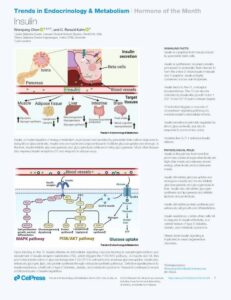
- Online date: October 16, 2024
- Insulin is the most well-known hormone and has been extensively studied but we still don’t know many of its actions
- I got invite from the TEM editor to write this and I extended the invitation to Ron for the co-write
- We added one point saying that impaired insulin signaling in the brain is implicated in the pathogenesis of neurodegeneration (my own area!!)
- DOI: 10.1016/j.tem.2024.09.001
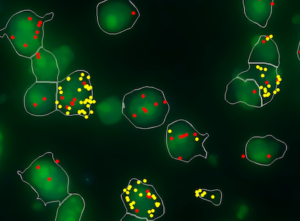
- This marks my first submission of a R grant, which is a major research grant at NIH.
- I am the only PI on this grant, so again, I am demonstrating my independence from my postdoc mentor
- The R21 mechanism is a high-risk/high-reward grant, which supports 2-year and non-renewable, but it will help accumulate data for a R01 submission.
- I aim to reveal the cellular and molecular mechanisms underlying the onset of neuropsychiatric symptoms (NPS) in AD patients.
- Above image is the one that help me generate hypothesis, showing the anatomical basis of co-localization of the two receptor systems I am planning to study.
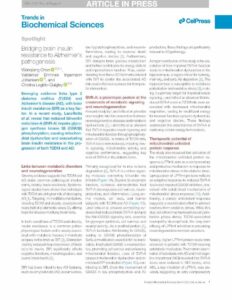
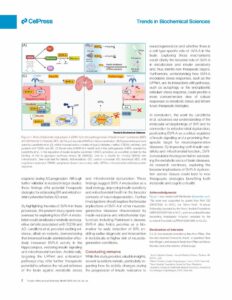
- Online date: October 1, 2024
- Last year I visited Dr. Eugenio Barone’s lab in Rome and gave a talk. He showed me the figures of an unpublished story.
- Now his story is published by Rodox Biology, and I must write a highlight to this wonderful work.
- I invited a PhD candidate at CBMR (Copenhangen University) and my DK mentor Cristina to co-write.
- here is the link: DOI: 10.1016/j.tibs.2024.09.004
- Talk title: Unraveling Glial Insulin Resistance: Insights into Alzheimer’s Pathogenesis
- First time visiting Kentucky and I love its Bourbon!
- Sanders-Brown is doing great work on ADRD research. So many PIs working on insulin as well!
- 3 nights and 4 days are usually very long for a visit, and I had so many great discussions on science and on life passions. I love every minute of this visit!
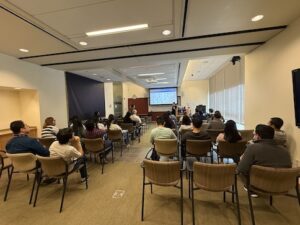
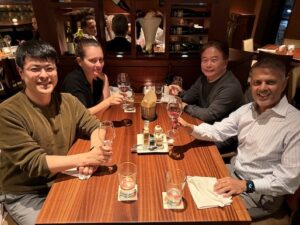
- Cristina is my mentor of Denmark’s visit, but she worked remotely in London
- See how science can work greatly without restrictions. If we are in the same area, we can always work together!
- Since Cristina is visiting Boston for an AD event, and we will have two-day overlap in Boston, I invited her to give a talk and visit my home institute. I contacted Prof. Young-Bum Kim at BIDMC to be the local host.
- It was a great talk and a great discussion!
07/2024 - 08/2024
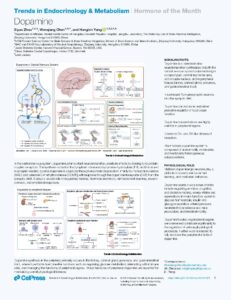
- Dopamine is well-known as a neurotransmitter in the brain for reward functions
- But in this mini-review, we discuss dopamine as a hormone
- link: https://www.cell.com/trends/endocrinology-metabolism/abstract/S1043-2760(24)00186-3

- This month I got two invitations to write reviews for Trends in Endocrinology and Metabolism.
- The first one, invited on August 1, was for writing a mini-review (Hormone of the Month) on Insulin, which I already submitted back to the Journal on August 19. Now it is under review
- The second one, invited on August 23, was for writing a Openion paper, the topic is “Insulin Resistance in its New Era”. I will co-lead this with Dr. Elizabeth Rhea. We are very delighted to have invited Dr. Stephanie Kullmann to co-write (updated 08/2024).
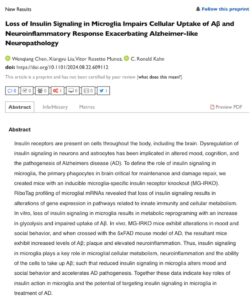
- My mentor has never submitted a manuscript to any preprints, but in order to help my applications to grants and faculty positions, he makes this exception!
- here is the link: https://www.biorxiv.org/content/10.1101/2024.08.22.609112v1
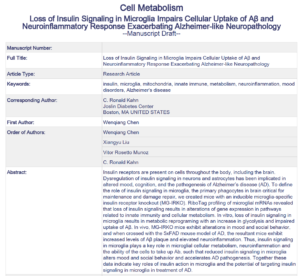
- We have internally revised for 11 versions before sending out
- We have added many new data to strengthen the conclusions
- We have submitted it to Cell Metabolism
- now it is with Neuron
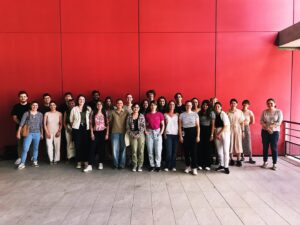
- my role as an instructor, selected based on merit
- Project: microglia phagocytosis in AD pathogenesis
- teamwork, teaching, project management

- Title: Microglial insulin signaling in health and in AD pathogenesis
- Invited by Prof. Andre Kleinridders at Potsdam University
- link: https://www.uni-potsdam.de/en/mem/nutritox-seminarreihe
- This is a zoom seminar
05/2024 - 06/2024
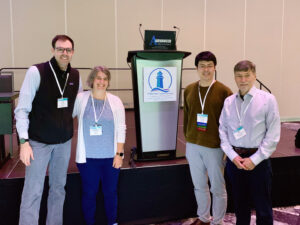
- Sesssion title: Metabolic Dysfunction, Neuroinflammation, and Alzheimer’s Disease
- Talk title: Microglial insulin signaling in health and in AD pathogenesis
- Selected as one of the 6 Member Sponsored Symposia
- Invited by Prof. William Banks at University of Washington, Seattle
- Link: https://www.pnirs.org/assets/docs/2024AnnualMeeting/PNIRS_2024_Program_Brochure.pdf
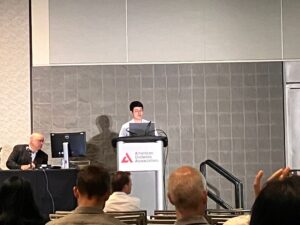
- Sesssion title: Novel Regulators of Insulin Action and Insulin Sensitivity
- Talk title: Microglial insulin signaling in health and in AD pathogenesis
- Selected as one of the 6 speakers in the session
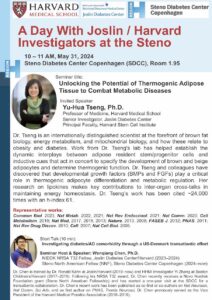
- Invited and hosted Prof. Yu-Hua Tseng to visit the Steno
- also shared my project at Joslin/Harvard and Steno
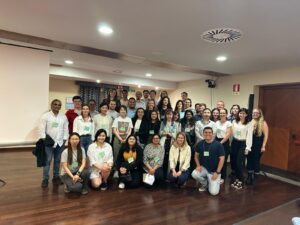
Talk title, “Identification of dmPAG Tac2+ Neurons in Regulating Mouse Aggression Behaviors”
- 2024 Gordon Research Seminar, Molecular and Cellular Neurobiology
- Session “Mechanisms of Neurodevelopment and Synaptic Signaling”
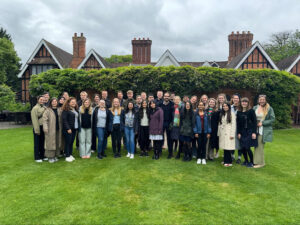
- The meeting rotates in 3 countries, United Kindoms, Denmark, and the Netherlands
- I am very lucky to be selected to represent Danish institute
- 30 delegates (meaning speakers), each has to give a talk (10 min + 5 min Q&A)
- Most of the talks are about clinical diabetes
01/2024 - 04/2024
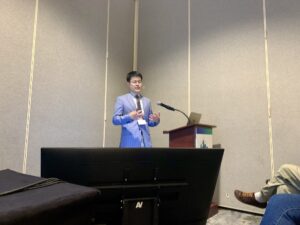
- My second time co-organizing a sympoium at the conferences
- Co-chaired with Dr. Elizabeth Rhea, a Research Assistant Professor from University of Washington Seattle
- We also have invited Dr. Shannon Macauley and Dr. Danielle Beckman.
- This is a full-house symposium, we are very proud!
- Link: https://www.asneurochem.org/2024-full-program
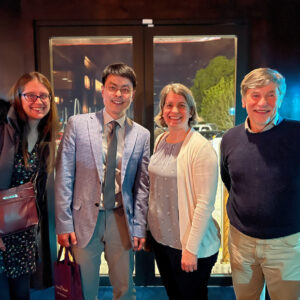
- Title of my talk, “Brain Insulin Resistance and Alzheimer’s Disease: A Role of Glial Cells”
- Invited by Dr. Elizabeth Rhea, University of Washington, Seattle
- I spend a day at the campus, having individual meetings with various investigators, and giving a seminar at noon
- Very enriched experience!
- This is a great place doing both diabetes and AD research
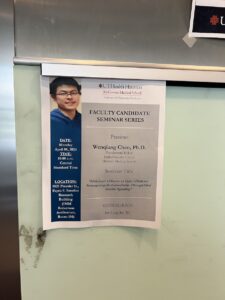
- Title: Alzheimer’s Disease as Type-3 Diabetes: Investigating the Comorbidity Through Glial Insulin Signaling
- Invited by Prof. Long-Jun Wu who recently moved to UT Health Houston to start a new institute
- In fact, this is my first onsite interveiw for an AP position
- This is one of the biggest medical campus in the world, very impressive
- The picture was taken in the elevator 🙂
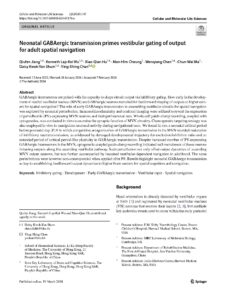
- Published: 19 March 2024
- https://link.springer.com/article/10.1007/s00018-024-05170-x
- A work from my PhD lab
- My contribution: co-author
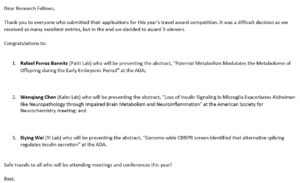
- I am one of the three awardees of this award
- $1,000 to attend a conference
- I have to say, this is one of the most difficult applications, I have had applied for many times, and finally I got it.
- That suggests, never give up!
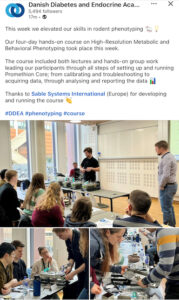
- Organized by: DDEA (Danish Diabetes and Endocrine Academy)
- selecte as one of the 20 participants, all things covered
- Mostly about the metabolic phenotyping in rodents
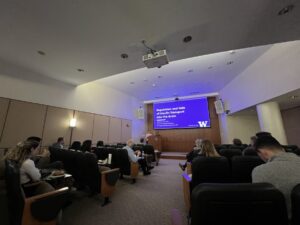
- In about one month after my Copenhagen visit, I went back to Boston from Copenhagen
- One of the important reasons for this homing is to welcome or to host Dr. Rhea’s visit
- Dr. Elizabeth Rhea is a long-time friend of mine, whose work on BBB I admired very much
- This is my first time meeting her in person! Truly my pleasure!
- Dr. Elizabeth Rhea’s visit is in fact a Joslin fellow nominated seminar series, two selection a year, highly competitive, but I am the one nominated her. Extremely happy to see she could be selected!
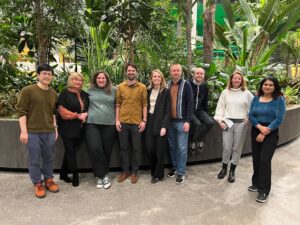
- My first time officially meet everyone in the department
- This yearly meeting discusses the plans of the department, very insightful
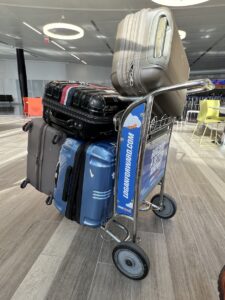
- I have to say this is the career-turnover moment
- Spending a year in Copenhagen, one of the best city for diabetes research (also for many things), this is extraordinary!
- Still think it is a dream!
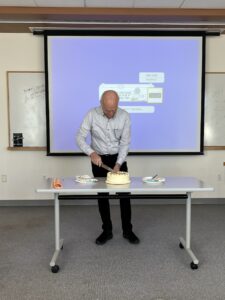
- It is amazing that a scientist could still love doing science like Ron does
- I hope I could still do science and mentor trainees at this age
01/2023 - 12/2023
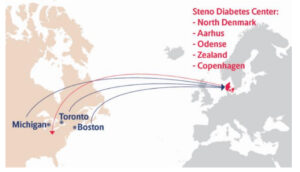
- I am more than grateful to thank Novo Nordisk Foundation’s selection!
- Still this is like a dream to me! Spending a year in one of the best diabetes institutes, amazing!
- See news on Steno’s website (New funding for collaborative diabetes research across Denmark and North America)
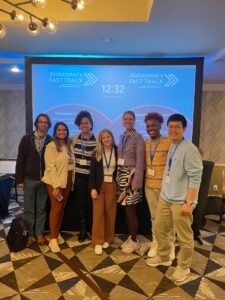
- We won a Runner-up, Mock BrightFocus Proposal Presentation (in a teamwork)
- This is a great experience to interact with everyone working on AD!
- Through a teamwork and supervised by an established PI, we chose a topic of interest and present a presentation to attract grant foundation, practicing all neccessary steps except to get a real grant.
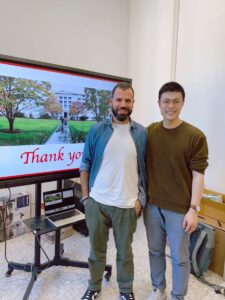
- Talk title: Comorbidity of Diabetes and Alzheimer’s: Centered on Glial Insulin Resistance
- Host: Dr. Eugenio Barone, Sapienza University of Rome, Rome, Italy
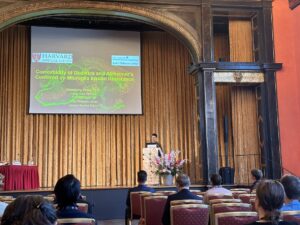
- Talk title: Impaired microglial insulin signaling mediates comorbidity of diabetes and Alzheimer’s disease: roles of brain metabolism and neuroinflammation
- It marks the first diabetes conference I have ever attended
- The conference is held during the Oktoberfest, a greatest event I have ever attended, and I drunk a lot of beers!! 🙂
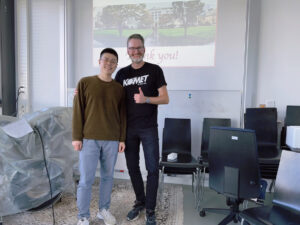
- Title: Brain Insulin Resistance and AD Pathogenesis: A Role of Glial Cells
- Invited by Prof. Alexander Bartelt, LMU, Munich, Germany
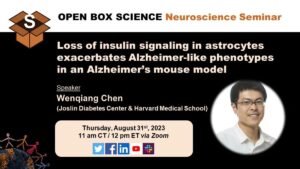
- Talk title: OBS Neuroscience Seminar: Diabetes and Alzheimer’s disease
- Moderator: Dr. Danielle Beckman (UC Davis)
- Invitor: Dr. Chih-Chung Lin (from Dr. Rudolph Tanzi lab at MGH and Harvard)
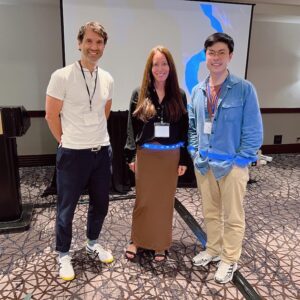
- Session title: Symposium 11: Neuromodulation of mood and its alteration in brain disorders
- Co-Chairs: Dr. Wenqiang Chen (Joslin/Harvard) and Prof. Andre Kleinridders (University of Potsdam)
- My talk title: Insulin signaling in microglia regulates brain metabolism, innate immunity and modulates mood and social behaviors
- Note: Unfortuanately Dr. Ying Zhang could not make it because she could not get the visa
- Session Abstract:
Emotional behaviors are regulated by many brain processes such as synaptic transmission and neuroimmune communication. Dysregulation of these processes leads to brain disorders including depression. Advances in this area have identified key brain substrates and circuits that control emotional behaviors, paving the path to mental wellness of these patients. More recently, mounting evidence has shown that mood can be modulated by neurohormonal and neuroimmune status, as such, perturbation of hormonal and immune systems can markedly impact on mood and increase the incidence of depression. In this symposium titled “Neuromodulation of mood and its alteration in brain disorders”, we invite investigators working on this topic to lead a discussion on unconventional aspects of this neuromodulation, aiming to stimulate ideas that could translate these findings to a better treatment of brain disorders including depression. The symposium will be co-chaired by Prof. Kleinridders (University of Potsdam, Germany) and postdoc trainee Dr. Chen (Harvard Medical School, USA). The other two invited speakers include Dr. Zhang (Tsinghua University, China) and Dr. Fulton (Universite de Montreal, Canada). Prof. Kleinridders started his lab in Germany in May 2015 and is now a full professor, focusing on understanding how brain insulin resistance impacts on mood and whether applying nutritional interventions can reverse depression. His recent work mainly published on Antioxidants, Molecular Metabolism, JCI Insights, Lancet Diabetes Endocrinol, etc. In this symposium, he will be talking about the crosstalk of nutrition and insulin action on brain metabolism and mood modulation. Dr. Chen started his second postdoc in October 2019 with Dr. C Ronald Kahn at Harvard Medical School. He mainly works on revealing cellular heterogeneity of brain reward system and molecular factors underly comorbidity of diabetes and brain disorders. His previous work mainly published on Nature communications, Nature Neuroscience, Science Advances, PNAS, and Trends in Neuroscience. He will be talking about the crosstalk of microglia and astrocytes regulated by insulin and how its dysregulation leads to mood and cognitive disorders. Dr. Zhang will finish her postdoc training with Prof. Guoping Feng at MIT soon and start her own lab in January 2023, as an assistant professor at Tsinghua University. She mainly works on identifying thalamic substrates that modulate motor, mood, and cognition. As a rising star in the area of neurological diseases, her recent work was published on Nature and highlighted by major media sources. Her other work was published on Neuron, Nature Communications, Nature Medicine, and Nature Reviews Neuroscience. In this symposium, she will be talking about her unpublished work on Cholinergic modulation of mood and behavior in neurological disease models. These talks will expand our current understanding of neuromodulation of mood/behavior to deeper levels that involve various neuromodulations (insulin, serotonergic, and cholinergic systems). Further, these talks will connect these mechanisms to neural and immune interaction. In summary, we anticipate the IBNS participants will learn from this symposium and stimulate collaborations for their further research.

- This is one of the best moments in academic career. I got a training grant from the NIDDK (T32), extremely grateful for all the support from my mentor, my institute and NIDDK!
- This is a career-turning point (I think only Ron and I know how important it is to me 🙂 )
- Project Title: Role of microglial insulin signaling in the development of AD and depression.
- Aims:
- (1) to characterize MG-IRKO/5xFAD mice, newly established by me, and to examine its validity in the investigation of disease comorbidity of type 2 diabetes and Alzheimer’s disease or depression.
- (2) to explore using iPS-derived microglial cells to study the aberrant insulin signaling in microglia and to reveal a shared common molecular target that can be used to treat patients with both AD and T2D.
- Mentor: Dr. C Ronald Kahn (Joslin/Harvard)

- This is one of the most important grants in academic career!
- With this grant, I will get additional training towards independence and opening my own lab
- So many people have helped me during this preparation.
- I have a feeling that, I really enjoy writing a grant proposal. This is very different from writing a manuscript (review or research article).
- I think my PI can be called a master of grant writing. He has taught me so many things in writing a successful grant. Hopefully mine can be successful.
- I hope I could pass on these to my future trainees.
- Two of the most important things I have learned:
- always start with a specific page
- spend most of time crafting this page and the research questions.
- Project Title: Dissecting insulin/IGF-1 receptor signaling in microglia: implication in AD pathogenesis.
- Project summary:
- This proposal outlines a three-year career development and research experience aimed at preparing the applicant to become an experienced independent investigator in the field of diabetes and Alzheimer’s disease (AD) comorbidity.
- The proposed research focuses on investigating insulin/IGF-1 signaling in microglia, with potential implications for public health, particularly for the patients with diabetes and AD.
- The applicant has also devised a comprehensive training plan that includes acquiring new laboratory techniques, participating in scientific seminars and courses, and furthering career development.
- Guidance and mentorship will be provided by Drs. C. Ronald Kahn and Rudolph E. Tanzi, two world-renowned experts in the fields of diabetes and AD research, respectively.
- Additionally, the applicant has assembled a scientific advisor panel to offer research and career guidance..
- Mentors:
- Dr. C Ronald Kahn (Joslin/Harvard)
- Dr. Rudolph Tanzi (MGH/Harvard)
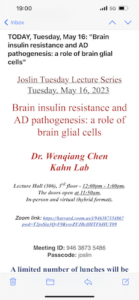
- Talk Title: “Brain insulin resistance and AD pathogenesis: a role of brain glial cells”
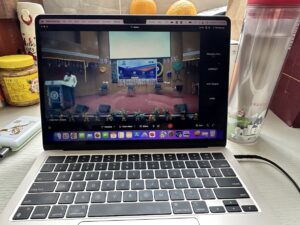
- This is not easy to give the talk, because I need to find a very stable WIFI to connect the Harvard VPN network!!
- The Harvard VPN really saved me!
- I almost had troubld finding a good WIFI, in the end, it went on very well! No disruption in network!
- By the time I said yes, I did not know I will be coming back home country to visit my parents
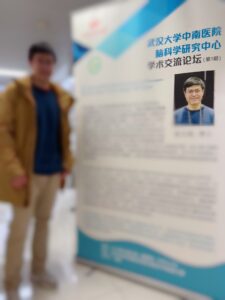
- Talk Title: “Understanding brain functions in diseases: from single-cell to single cell types”
- In fact, Wuhan University is the one I really wanted to attend my undergraduate, but they did not give me a chance.
- Now giving me the chance to present is a big honor
- This Medical School has a very strong metabolism program, sometimes they published Nature or Cell Metabolism easily
- Plus, I met my previous labmate (we never saw each other but we shared the same bench!!), Prof. Wei Jiang!
Pre-2023
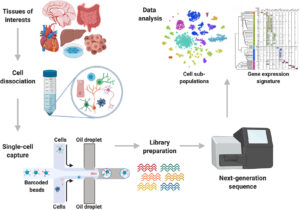
- Title: An Introduction to Single-Cell RNA-Seq Analysis and its Applications
- Role: first author
- Editor-in-Chief: Olaf Wolkenhauer
- Link: https://doi.org/10.1016/B978-0-12-801238-3.11592-2
- https://www.sciencedirect.com/referencework/9780128160787/systems-medicine
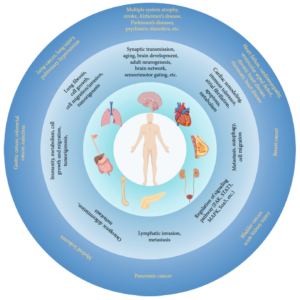
- Title: Disease-Associated Circular RNAs: From Biology to Computational Identification
- Role: corresponding author
- I enjoy reading papers and making summary. Sometimes I like the illustration process.
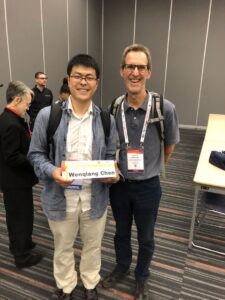
- Talk title: scRNA-seq of mouse nucleus accumbens reveals a subtype of D1 MSN
- Prof. Andrew Gundlach from Australia, Florey Institute, is the chair of our session.
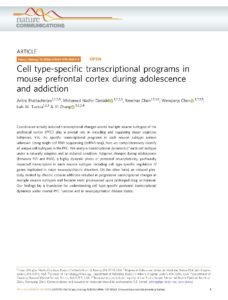
- Title: Cell type-specific transcriptional programs in mouse prefrontal cortex during adolescence and addiction
- Role: co-first author.
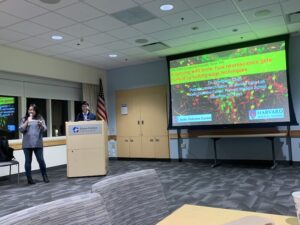
- Talk title: Dancing with tools: how neuroscience gets pushed by cutting-edge techniques
- Harvard Medical Chinese Scholars and Scientists Association
- I spoke in Chinese, I have to admit but all the slides are English

- This is one of the important leadership role I have played
- It is a very enriched experience working with everyone from different institutions at Harvard medical school.
© 2025 All Rights Reserved.
Share:
More Posts
Global Collboration with Young PIs
Global Collaborationwith Young PIs My general statement: Do something, not be someone. Wenqiang Chen, Ph.D. As a young investigator in the field of neuroscience, I
Leadership
Leadership My general statement: Do something, not be someone. Wenqiang Chen, Ph.D. To me, leadership is one of the most essential qualities in any profession.
Mentorship – my Mentees
wenqiang.chen@joslin.harvard.edu wenqiang.chen.01@regionh.dk Teaching & my mentees My general statements: “Having been shaped by incredible mentors, I am committed to paying it forward. My goal is
Mentorship – my Mentors
wenqiang.chen@joslin.harvard.edu wenqiang.chen.01@regionh.dk Mentorship My general statements: – Research lets me explore science and teach it. – Great scientists should also be great mentors. – Great
